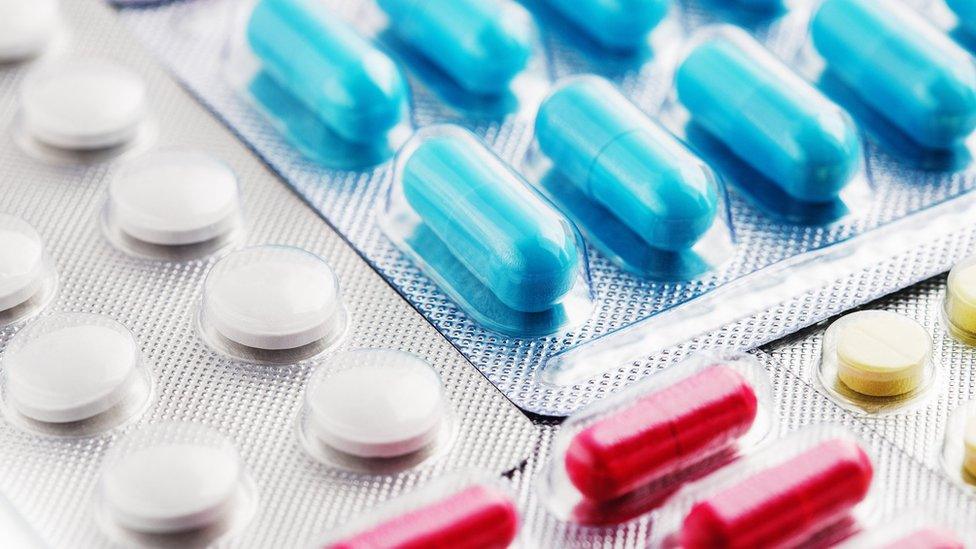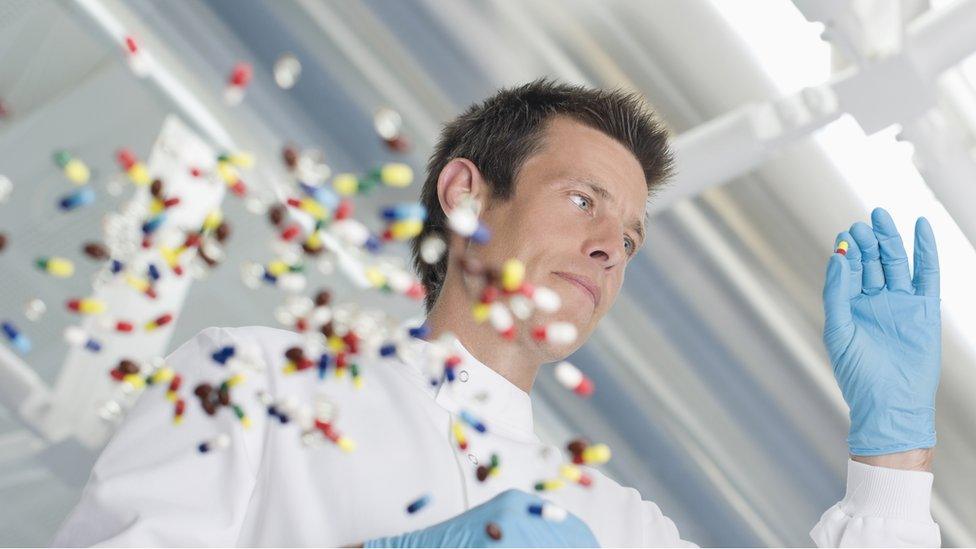Brexit: Is NHS already finding it hard to get medicines?
- Published

Supply shortages and rising prices for some medicines are being reported by pharmacists and GPs. The possibility of a no-deal Brexit is being blamed.
So what is going on in the pharmaceutical world and what might it mean for patients?
There is nothing new about occasional shortages of certain types of medicine.
But there are reports of more acute problems than usual and some are citing a market reaction to the risk of the UK leaving the European Union without a deal.
Public may have to stockpile drugs in no-deal Brexit
Six key questions Brexit poses for the NHS
Brexit: NHS managers warn about impact of no deal
The organisation that negotiates drug pricing on behalf of pharmacies told BBC Radio 5 Live's Wake up to Money that Brexit is already affecting the supply and price of some key generic drugs.
The programme was contacted by a patient unable to obtain the usual anti-inflammatory for her arthritis who was told she had to have a substitute because of shortages.
Simon Dukes, chief executive of the Pharmaceutical Services Negotiating Committee (PSNC), said there were supply shortages for a number of reasons and that "concerns around a no-deal Brexit are likely to exacerbate those ongoing issues".
In a letter to the Health Select Committee he referred to recent price rises, saying: "The surge may be due to a combination of factors including Brexit planning and contingency."
Generic medicines
The medicines market is complex. The big pharma companies market their own-brand drugs and the overall cost to the NHS is capped each year.
Once a patent expires, drugs become "generic" which means that any manufacturer and distributor can make and sell them.
The prices of these generic medicines rise and fall in a market which can be opaque.
Pharmacists have to pay the going rate and claim back from the NHS according to an agreed tariff but sometimes that tariff doesn't keep up with market moves and that leaves pharmacies out of pocket.
It is the price and supply of these generics which have caused concern amongst pharmacies.
Their cash flow comes under severe pressure if the extra costs of the generic drugs are not covered quickly by the NHS.
Sometimes wholesalers cannot immediately replenish supplies at pharmacies and that means disappointment for GPs and patients.
Stockpiling is a vexed issue.
The government has told manufacturers of both branded and generic drugs to ensure that six weeks' worth of supplies have been built up to ensure continuity in the event of a no-deal Brexit.
This exercise has been largely successful.
Hospitals and patients have been told not to build up their own private supplies.
Unofficial stockpiling
But the PSNC suspects that there is unofficial stockpiling of generic drugs somewhere in the medicines supply chain.
A combination of that and distributors possibly raising prices in anticipation of there being no deal are factors in the recent market moves.

Pharmacists report difficulties obtaining some drugs
In response to the BBC Radio 5 Live story, there have been tweets from GPs, pharmacists and patients pointing to difficulties obtaining certain drugs.
There is clearly a feeling that these problems go beyond the occasional supply issues seen in the system.
The Department of Health and Social Care told the BBC: "Our number one priority is to ensure the continued supply of medicines and we work closely with industry and partners in the health system to help prevent disruption.
"The department has well-established processes to manage and mitigate the small number of supply problems that may arise at any one time due to manufacturing or distribution issues."
The British Generic Manufacturers Association denied there had been a "surge" in prices and said global market forces as well as Brexit were at play.
The association added: "We are working with the government, in the same forums as the PSNC, to ensure that patients can continue to receive their medicines in the case of a no-deal Brexit.
"If all in the supply chain are following the government's advice and not hoarding supplies of medicines, this should have no impact on current prices."
The government's line is that contingency plans for a no-deal Brexit are in place, including chartering aircraft to bring in drugs with a short shelf-life.
But there are concerns in the health world as the UK's departure from the EU draws nearer.
Some question whether a six-week official stockpile is enough. Others point to the recent price rises of generic drugs as a pointer to what might happen in the event of a disorderly Brexit.